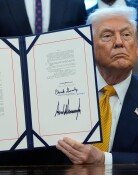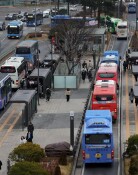Conservative Forces Mightier Compared to 2004: Analysis
Conservative Forces Mightier Compared to 2004: Analysis
Posted May. 02, 2008 03:06,
Conservative forces, including the Grand National Party, fared better in the 18th general elections this year in comparison with the performance of progressive forces, including the Uri Party, in the 17th general elections in 2004.
In the 17th general elections, progressive parties won more than half of the votes in 2,340 eup/myeon/dongs (the smallest administrative units), leading conservative parties that garnered more than half of the votes in 1,009 eup/myeon/dongs only.
On the contrary, conservative parties won more than half of the votes in 2,759 eup/myeon/dongs in the 18th general elections, far more than progressive parties that managed to secure more than half of the votes in 672 eup/myeon/dongs only.
The conservative front also received a greater percentage of the votes in all 245 cities and counties nationwide in this years general elections in comparison to the 2004 elections. The only city that saw a rise in the percentage of the votes in favor of the progressive front was Naju in North Jeolla Province.
The Dong-A Ilbo conducted an analysis on the results of the votes in 3,562 eup/myeon/dongs in the 17th parliamentary elections and 3,542 eup/myeon/dongs in the 18th parliamentary elections, based on data from the National Election Commission. The geographic information system and computer assistance reporting method were employed to assist the analysis.
In the analysis, the GNP and the United Progressive Democrats were regarded as conservative parties in the 17th National Assembly elections, and the GNP, the Liberty Forward Party and the Pro-Park Alliance in the 18th elections. The Uri Party, the Democratic Party and the Democratic Labor Party were counted as progressive parties in the 17th parliamentary elections, and the UDP, the DLP, the Creative Korea Party and the New Progressive Party in the 18th elections. Minor political parties and parties with ambiguous ideological traits were excluded.
By eup/myeon/dong in the 18th parliamentary elections, conservative parties won the biggest portion of the votes with 89.3 percent (Bisan-dong, Daegu) and more than 80 percent in 380 districts, followed by 70 to 80 percent in 777, 60 to 70 percent in 725 and 50 to 60 percent in 876. Progressive parties won the largest portion of the votes with 91.3 percent (Bonghwang-myeon, Naju) and more than 80 percent in 292 districts, followed by 70 to 80 percent in 307, 60 to 70 percent in 29 and 50 to 60 percent in 43. This shows that the number of districts where progressive forces won more than half of the votes is far less than that of conservative forces.
In the 17th elections, progressive forces earned the biggest portion of the votes with 97 percent (Unnam-dong, Gwangju) and more than 90 percent in 438 districts, followed by 70 to 90 percent in 216, 60 to 70 percent in 725 and 50 to 60 percent in 960. Conservative parties received the largest portion of the votes with 76.2 percent (Gaeryeong-myeon, Gimcheon) and more than 70 percent in 46 districts, followed by 60 to 70 percent in 377 and 50 to 60 percent in 586 districts.
By region, the biggest swing in the voters sentiment towards conservatism was seen in the Chungcheong provinces.
In Seoul, where the dynamics of the elections were determined this year, progressive forces outperformed in 473 of 520 dongs in the 17th elections. However, conservative forces led the progressives in the 18th elections in 445 of 487 dongs.
Yoon Jong-bin, a professor of political science and diplomacy at Myongji University, and Park Won-ho, a professor of political science at the University of Florida, participated in the analysis.
ditto@donga.com hjkwon@donga.com







